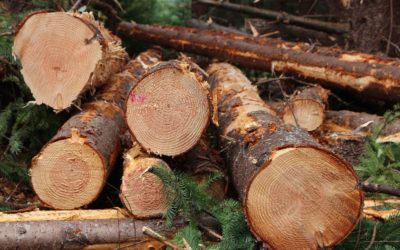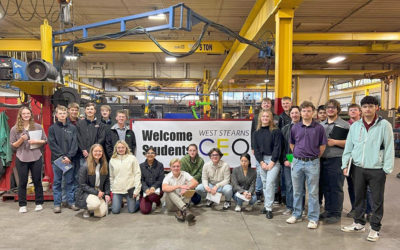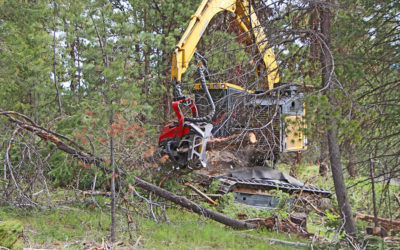Spotted Owl Back In Court
Preservationist groups and timber industry interests have filed lawsuits against the U.S. Fish & Wildlife Service over developments concerning critical habitat acreage designation for the Northern Spotted Owl, which has been listed as a “threatened” species (not endangered) since 1990 under the Endangered Species Act.
Federal acreage set aside for the owl, and related reductions in national forest timber sales caused a major disruption to the Northwest forest products industry in the 1990s that lingers to this day.
Preservationists filed a lawsuit March 23 in U.S. District Court for the District of Oregon, Portland Division, claiming USFWS bypassed procedures, laws and all reasonable discretion when in January the USFWS ruling published in the Federal Register eliminated 3.472 million acres of federal land from the owl’s critical habitat designation in Washington, Oregon and California counties—an amount that was increased from 204,000 acres in 15 Oregon counties in a preliminary proposal by USFWS in 2020.
Preservationists are asking that the USFWS ruling be totally struck. Some of the preservationist groups acting as plaintiffs include Wilderness Society, Sierra Club, Audubon Society, Environmental Protection Information Center and others.
Meanwhile USFWS delayed the effective date of its ruling through the end of April and possibly beyond, calling for more public comment. One of the reasons for the delay, according to USFWS, was that the incoming presidential administration recommended that all rules published in the Federal Register but that had not taken effect should undergo further review.
USFWS stated, “We are delaying the effective date of the final rule to give us time to consider questions of law, policy and fact in regard to that final rule,” adding that “in light of the litigation history of northern spotted owl critical habitat designation, we are reviewing whether the rulemaking was procedurally adequate.”

Subsequently, American Forest Resource Council joined the Assn. of O&C (Oregon & California) Counties and other counties in Washington, Oregon and California in a lawsuit challenging the USFWS delay in implementing its January ruling.
The January 2021 critical habitat designation removed areas that are not habitat for the owl and have been set aside for timber production under the Northwest Forest Plan and federal law, according to AFRC, adding that acreage setasides for the owl this century have cost Pacific Northwest communities more than a billion dollars and over a thousand family-wage jobs, while providing little benefit for species conservation.
“The 2021 designation aligns NSO critical habitat with federal law, modern forest science, and common sense at a time when unprecedented and severe wildfires threaten both owls and people from northern California to Washington State,” AFRC stated. “We are challenging the delay because it violates federal laws and wrongfully restricts timber harvests on non-NSO habitat.”
The delay also restricts the use of active forest management tools that help reduce the risks of severe wildfires—the kind that burned more than 560 square miles of suitable nesting and roosting spotted owl habitat in Oregon last year, AFRC stated. The AFRC lawsuit, filed in U.S. District Court for the District of Columbia, alleges USFWS failed to provide a lawful justification for the delay, nor did it provide the public with notice or opportunity to comment.
Critical habitat acreage designation for the owl has hovered around 6.8 million acres of federal land, not including national parks, national wildlife refuges, and congressionally designated Wilderness areas where logging is largely prohibited, since the original USFWS designation in 1992.
The AFRC lawsuit argues the USFWS critical habitat designation was the product of extensive public comments and is consistent with the agency’s obligations under the Endangered Species Act and the O&C Act. The lawsuit asks the U.S. District Court to vacate the USFWS’ delay and declare the 2021 critical habitat designation as immediately effective.
Latest News
Sustainable Forests Report Has Mixed Results
Released in September, the “National Report on Sustainable Forests, 2020” from the U.S. Dept. of Agriculture (USDA) and Forest Service (FS) shows both good and challenging trends as the nation’s forestland owners seek sustainable ownership and management options. The fourth such effort since 1997, the report is 60 pages…
Rotochopper Celebrates Manufacturing Month
During the month of October, Rotochopper shines a spotlight on the incredible innovations, processes, and stories that make the company a standout in the world of manufacturing. Individuals were invited to explore the latest advancements in manufacturing technology by participating in the Central Minnesota Manufacturers Assn. (CMMA) virtual tour of manufacturing…
Restoration Efforts Working In Eastern Oregon
Forest thinning is improving the robustness of older trees and enhancing native biodiversity on federal lands in eastern Oregon, evidence that collaborative efforts to restore forests are working, research by Oregon State University shows. The study led by James Johnston of the OSU College of Forestry involved long-term monitoring and research partnerships between OSU, the U.S. Forest Service and local groups in Oregon’s Blue Mountains…
WANT MORE CONTENT?
Spanning seven decades since its inception in 1952, Timber Harvesting highlights innovative and successful logging operations across the U.S. and around the world. Timber Harvesting also emphasizes new technology and provides the best marketing vehicle for the industry’s suppliers to reach the largest number of loggers in North America and beyond.
Call Us: 800.669.5613



